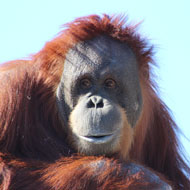Food giant suppliers linked to rainforest destruction

Scientists have said that deforestation for palm oil is posing a serious threat to orang-utans and other endangered species.
New research by Greenpeace shows palm oil suppliers to food giant Mondelez have destroyed 70,000 hectares of rainforest in Indonesia, including 25,000 hectares of orang-utan habitat - in just two years.
Mondelez is one of the world’s biggest palm oil buyers. It is used for many of its best-known products, including Cadbury chocolate bars, Oreo cookies and Ritz crackers.
Kiki Taufik, head of Greenpeace Southeast Asia’s Indonesia forests campaign said: “It’s outrageous that despite promising to clean up its palm oil almost ten years ago, Mondelez is still trading with forest destroyers.
“Palm oil can be made without destroying forests, yet our investigation discovered that Mondelez suppliers are still trashing forests and wrecking orangutan habitat, pushing these beautiful and intelligent creatures to the brink of extinction. They’re literally dying for a biscuit.”
Scientists have said that deforestation for palm oil is posing a serious threat to orang-utans and other endangered species. A comprehensive meta-study last year showed Bornean orang-utan numbers have halved in 16 years. Recent studies also show that both the Sumatran and Tapanuli species lost more than half their habitat between 1985 and 2007.
Richard George, Greenpeace UK forests campaigner, said: “Mondelez's new tagline, revealed in September, is ‘snacking made right’, but there's nothing right about palm oil produced by killing orangutans and fuelling climate change.
“This must be a wake up call to Mondelez and other household brands to take action, starting with cutting off the dirtiest palm oil trader of all, Wilmar, until it can prove its palm oil is clean. Ultimately, if big brands can’t find enough clean palm oil to make their products, they need use less."
The findings by Greenpeace were released just after Mondelez International issued a statement calling for palm oil suppliers to act faster to eliminate deforestation.
Jonathan Horrell, global director of sustainability at Mondelēz said: “We will continue to pursue existing and new initiatives that seek to drive effective change across palm oil-growing communities.
“The company understands that this complex challenge can only be solved through collaboration with all actors in the palm oil supply chain, from growers to suppliers and buyers, as well as local and national government and non-governmental organizations.”



 The RCVS has announced a new version of its 1CPD mobile app, with enhanced features for veterinary surgeons and veterinary nurses to record their continuing professional development.
The RCVS has announced a new version of its 1CPD mobile app, with enhanced features for veterinary surgeons and veterinary nurses to record their continuing professional development.